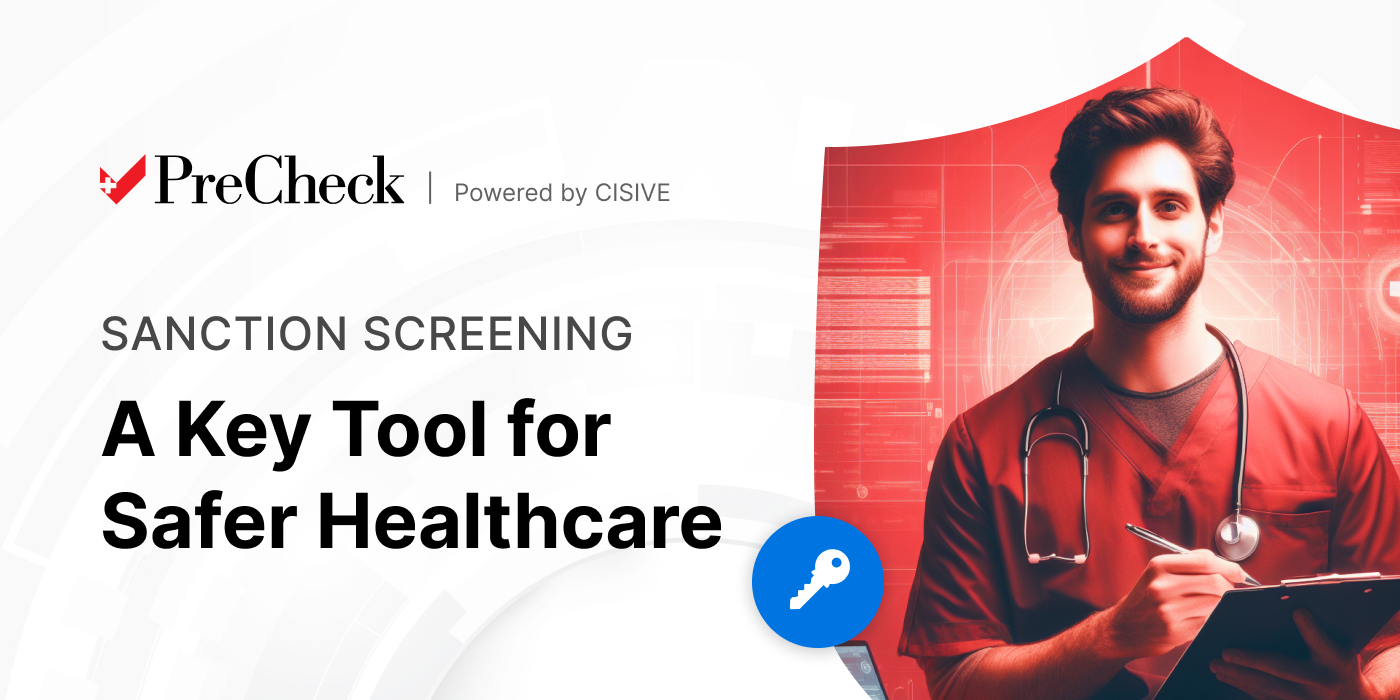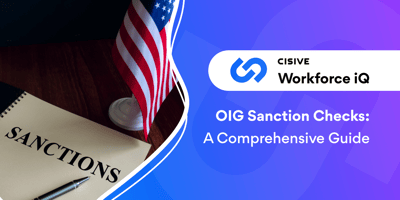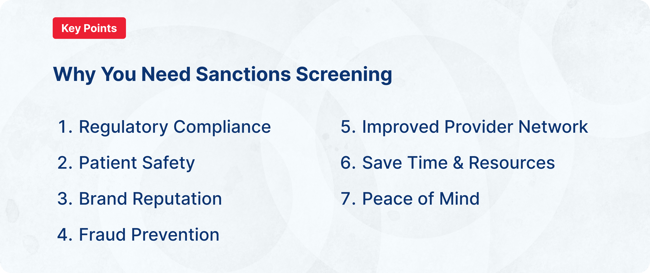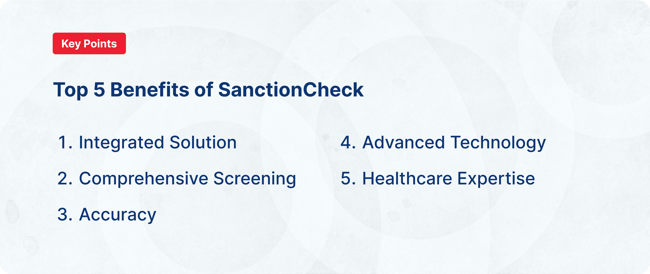

In the complex world of healthcare, OIG sanction checks are non-negotiable. These checks are far...

Healthcare organizations are responsible for ensuring they hire trustworthy employees and engage in ethical business practices. One way to achieve this is by conducting healthcare sanctions screenings on potential employees, contractors, or business partners.
In this blog, we’ll discuss the benefits of healthcare sanctions checks, the importance of partnering with a reputable screening provider, and the steps to successfully run a sanctions check.
Key Takeaways
|
The federal government has put a system in place in which sanctioned/excluded individuals and entities are not allowed to either participate or receive payments funded through federal agencies.
In healthcare, this means that individuals or entities excluded are not allowed to receive payment for services that are funded by Medicare or Medicaid or any other federal health programs such as TRICARE or CHIP.
Whenever we are talking about healthcare exclusions, you will always come across the Department of Health and Human Services' Office of the Inspector General.
The effect of an exclusion is that no payment will be made by any Federal healthcare programs for any items or services furnished, ordered or prescribed by an excluded individual or entity.
This payment prohibition applies to the excluded person, anyone who employs or contracts with the excluded person, any hospital or other provider for which the excluded person provides services, and anyone else.
Further, they say that the exclusion applies regardless of who submits the claims and applies to all administrative and management services furnished by the excluded person. All of that said, the definition of who can be considered excluded is broad.
The term exclusion, though technically different from a termination or debarment, is often used interchangeably.
Termination generally refers to a party’s inability to bill federally funded healthcare programs like Medicaid or Medicaid for services rendered. Debarments are generally a ban. A sanction is an action against a party.
Regardless of what these may be called, they are often used synonymously in sanction screening because they are the effect of an involuntary removal from participation in their respective programs.
Something to note is that excluded individuals are not necessarily prohibited from conducting business in the healthcare industry and the guidance in the OIG Special Bulletin will confirm this, but their options do become limited when they want to conduct business with anyone receiving federal healthcare funds.
Ultimately, it is the responsibility of the provider that none of the payments coming from the government go to sanctioned individuals/entities.
This means healthcare providers need to have a program in place to make sure that you are not employing or working with an excluded individual or risk Civil Monetary Penalties that can be very costly to any company or provider.

A healthcare sanctions check helps organizations comply with state and federal regulations, such as the Office of Inspector General (OIG) and the General Services Administration (GSA). Failure to comply with these regulations can result in penalties and fines.
Conducting a healthcare sanctions check helps ensure that the individuals employed or contracted by healthcare organizations have not engaged in misconduct, fraud, patient abuse, or patient neglect.
By hiring trustworthy employees and engaging in ethical business practices, healthcare organizations can improve their brand reputation and attract more patients.
A healthcare sanctions check helps prevent fraud by identifying individuals with a history of fraudulent behavior in the healthcare industry.
Conducting a healthcare sanctions check as part of the screening process helps organizations build a stronger provider network by ensuring individuals are not excluded from participation in federal healthcare programs.
Performing healthcare sanctions screenings in-house is time-consuming and resource-intensive, with the additional risk of not obtaining accurate results. By partnering with a reputable screening provider, healthcare organizations can save time, allocate resources more efficiently, and get better results.
Partner with a reputable screening provider that specializes in healthcare sanctions checks, such as PreCheck, ensures that your organization has access to comprehensive state and federal databases and expertise in navigating complex regulatory requirements.
This ensures that the screening process is accurate and consistent, minimizing the risk of errors and false positives or negatives.
Identifying individuals who require a healthcare sanctions check involves not only potential hires and contractors but also existing staff and partners, with a focus on those holding licenses or certifications and those involved in patient care or billing practices.
The determination on who requires a sanctions check is typically dependent on the individual's role within the healthcare organization, their level of patient interaction, and their involvement in handling or decision-making on financial matters.
It's crucial to embed candidate consent forms in your application process, as this step not only adheres to the privacy regulations but also sets the groundwork for an ethical and transparent hiring process.
To ensure you have the most accurate information, it's crucial to verify the candidate's details such as their legal name, any aliases, residential history, and previous employers, which contributes to more comprehensive and accurate healthcare sanctions screenings.
Choosing a background screening provider with expertise in the healthcare industry, such as PreCheck, is crucial as it ensures the most accurate results, compliance with industry-specific regulations, and the ability to interpret complex data effectively.
PreCheck addresses any potential matches through a meticulous verification process, thereby ensuring the delivery of an accurate and verified list of excluded individuals and entities.
If the results of the sanctions check are unfavorable, it is essential to notify the individual with an adverse action notification as required by law, protecting both the rights of the individual and the integrity of the organization.
Utilizing a reputable screening provider like PreCheck not only facilitates accurate and comprehensive sanctions checks, but also ensures that all the necessary documentation related to a candidate's screening process is correctly and meticulously maintained, providing a solid audit trail for compliance purposes.

SanctionCheck's integrated sanctions screening process enhances background checks by delivering comprehensive and accurate results while saving time through automation. This efficient approach enables HR and compliance teams to prioritize strategic tasks, improving the hiring process by swiftly identifying any potential issues.
Healthcare organizations must use a screening provider that checks federal and state exclusion lists to prevent past misconduct, fraud, or patient abuse from disqualifying potential employees or partners from healthcare programs. Staying current with these lists is challenging due to frequent updates. SanctionCheck saves time, resources, and safeguards against unintentional non-compliance, protecting the organization's reputation and patient safety.
SanctionCheck from PreCheck offers high-precision sanctions screening through multi-level verification, minimizing false positives and associated complications and costs. Every potential match undergoes rigorous evaluation and cross-validation against various data points to confirm their identity on sanctions lists, highlighting PreCheck's dedication to delivering dependable results, enhancing trust in our solutions.
PreCheck uses cutting-edge technology to provide healthcare employers with an efficient, accurate, and comprehensive background screening solution. Our advanced SanctionCheck system simplifies and speeds up sanction screening by utilizing an extensive database that covers federal and state exclusion lists. By leveraging SanctionCheck, healthcare organizations can confidently make informed hiring decisions, ensuring patient safety, regulatory compliance, and a strong brand reputation.
PreCheck leads in healthcare regulatory expertise, keeping SanctionCheck up-to-date with the latest rules and guidelines. Our deep knowledge ensures that sanctions screening is not only thorough and accurate but also compliant with current legal standards. This results in a reliable screening process that reduces risks and protects patient safety and organizational integrity.
Healthcare organizations benefit from conducting a healthcare sanctions background check on potential employees, contractors, or business partners.
Partnering with a reputable screening provider, such as PreCheck, and following the steps outlined in this blog post help ensure accurate and efficient screening processes that comply with state and federal regulations.
Conducting healthcare sanctions checks is an essential part of a healthcare provider’s efforts to ensure patient safety, reduce risk, and maintain a strong ethical reputation. Contact a PreCheck expert for a free evaluation of your current screening program today!

In the complex world of healthcare, OIG sanction checks are non-negotiable. These checks are far...

As PreCheck’s Principal Consultant for Sanction Screening, I work with healthcare compliance...

The patient census doesn't decrease just because you're short-staffed.